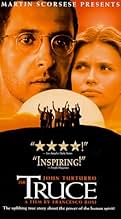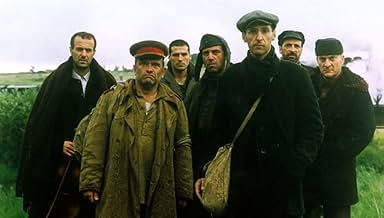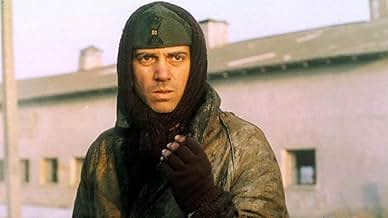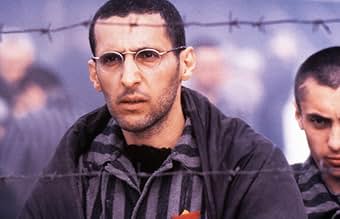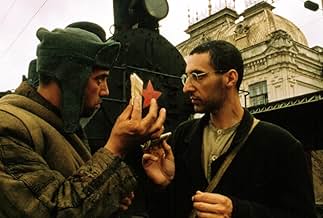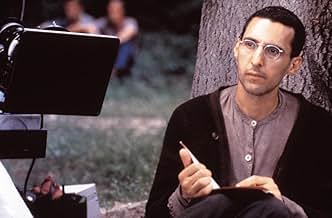Italian Jews journey back from Auschwitz after WWII, confronting challenges of reintegrating into society and uncertainties about familial circumstances awaiting them at home.Italian Jews journey back from Auschwitz after WWII, confronting challenges of reintegrating into society and uncertainties about familial circumstances awaiting them at home.Italian Jews journey back from Auschwitz after WWII, confronting challenges of reintegrating into society and uncertainties about familial circumstances awaiting them at home.
- Awards
- 7 wins & 9 nominations total
- Irina
- (as Tatyana Meshcherina)
Featured reviews
Great..
Almost!
The broad scope of the book could not be shown and the internal thought processes simply did not make the transition.
I am surprised that this movie about Auschwitz most famous inmate Primo Levi is not more well-known?!
Note: for the people that have never heard of "Is this a Man" - which describes his experiences in Auschwitz - one of the most impressive books that I have ever read.
With great acting and stunning scenes it is an altogether convincing image of how the situation may have been in the period up to the end of the war. It does not show the continuous women abuse that was ongoing during those times, but it shows that hunger and food were a day to day battle.
Overall, this movie deserves a score of 7.4 / 10, resulting in a very well earnt 7 star IMDb rating. I am personally surprised by the fact that this movie is not more known.
Good intentions, but PLEASE stick to the book
Many years before, Rosi had succesfully filmed 'christ stopped at Eboli', which was also based on an autobiography (Carlo Levi, not related to Primo) of the fascist period. Rosi did well not to choose Primo Levi's 'if this is a man' (se questo e un uomo), which describes the unimaginable experiences of Levi in the German Lager, he chose what could be called its' 'sequel'. 'the truce' ('la tregua') in which Levi describes his journey home from the camp in Poland to Turin, Italy, which took him an absurd nine months.The film starts when killingfactory Auschwitz-Birkenau is liberated by the Russians and the survivors are freed and put in trains, not to go home directly, but to be send to other camps. From there the journey continues, by train, by foot, meeting various characters. Levi, played by John Torturro, is a silent man who now and then expresses wise words or memorable sentences, but somehow never really makes you think. It's a man we follow, but doesn't touch us, let alone move us. This is not Turturro's fault, he gives a fairly good performance, but Rosi wants too much tell an important story, forgetting the ones who ARE the story; namely the characters. None of them is very well worked out. Take the Greek Nahum, in the book a surpising, colourful person, here just one-dimensional. Symbolism is overly present; Levi who doesn't want to throw away his campjacket, 'to remember' is credible, but the survivors are faced with german prisoners twice and it's given an unconvincing weight, as one German throws himself on his knees, when he sees Levi and his yellow star of David, far too grotesque. Another unconvincing role is given to the music, it's overly present, even a violin is stolen (where Rosi had this idea from is very unclear??) for no good reason. Music should be on the background.
I am sure Rosi had good intentions, but sometimes it's better to read and reread a book and try to reach as many people as possible in that way.
**out of ***** If this is a man (se questo e un uomo)-primo Levi The truce (La tregua) - Primo levi The saved and the drowned (I sommersi e i salvati)-Primo levi
The Holocaust: with some detail you've never seen before...
I liked the film for its apparent accuracy in location and the detail of what it was like for some of the Jews liberated from Auschwitz to find their way back to their homelands. Virtually helpless, the Jews in Primo Levi's autobiography embark on an odyssey that eventually gets them back to their homes -- at least some of them. All the more surprising is that Stalin's Soviet Union is their main benefactor throughout all of this. While this is supposed to be an autobiography, I have to wonder at some of the scenes, for example, when the train load of Jews arrives at the Munich main rail station, a former Werhmacht soldier kneels before them. In another, a Jew with barely enough food for himself, gives some bread to German POWs in Russia so that he can watch them fight over it. The irony is unmistakable.
Overall, I liked the film. It's one you have to see more than once because of all the detail. It's a bit difficult to follow the dialog in part, because much of it is in the language of the people who are represented: Poles, Russians, Ukrainians, French, Germans, Italians. Not only that, but the English dialog is accented and somewhat difficult to follow.
I intend to see it at least one or two more times in order to get the full effect of this very well done story.
Did you know
- TriviaFinal film written and directed by Francesco Rosi.
- Quotes
[last lines]
Primo Levi: [narrating] You who live secure in your warm houses, who return at evening to find hot food and friendly faces. Consider if this is a man who labors in the mud, who knows no peace, who fights for a crust of bread, who dies at a yes or a no. Meditate that this took place.
- ConnectionsFeatured in The Movie Show: Episode dated 19 October 1997 (1997)
- SoundtracksMadonina
Written by Giovanni D'Anzi (as G. D'Anzi)
- How long is The Truce?Powered by Alexa
Details
Box office
- Gross US & Canada
- $71,448
- Opening weekend US & Canada
- $23,165
- Apr 26, 1998
- Runtime
- 2h 5m(125 min)
- Color
- Sound mix
- Aspect ratio
- 1.85 : 1

